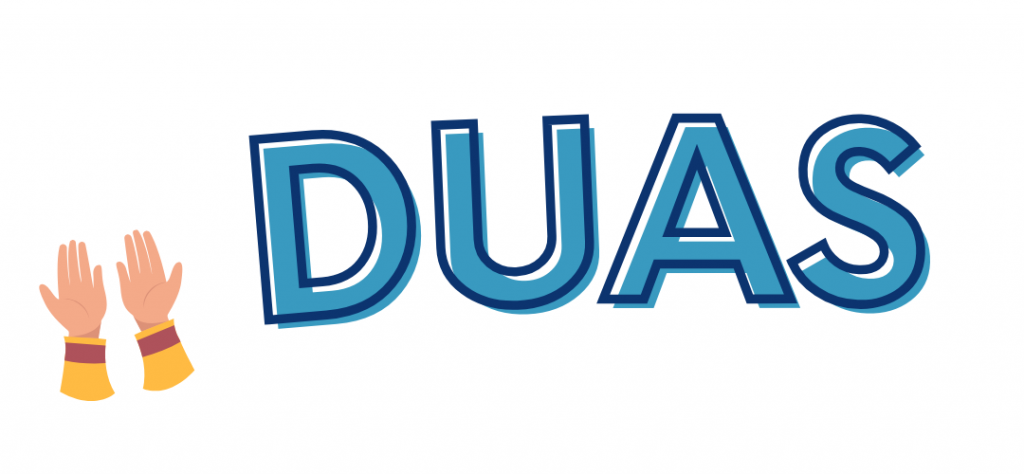05 Mar Duas and Etiquettes as Muslims

General Duas
اللَّهُمَّ إِنِّي أَسْأَلُكَ عِلْماً نَافِعاً، وَرِزْقاً طَيِّباً، وَعَمَلاً مُتَقَبَّلاً
Allaahumma ‘innee ‘as’aluka ‘ilman naafi’an, wa rizqan tayyiban, wa ‘amalan mutaqabbalan
اللَّهُمَّ إِنِّي أَسْأَلُكَ الْجَنَّةَ وَأَعُوذُ بِكَ مِنَ النَّارِ
Allaahumma ‘innee ‘as’alukal-jannata wa ‘a’oothu bika minan-naar
O Allah , I ask You for Paradise and seek Your protection from the Fire. Abu Dawud: 792
After finishing a meal
الْحَمْدُ لِلَّهِ الَّذِى اطْعَمَنَا وَسَقَانَا ، وَجَعَلنَا مُسْلِمِينَ
Alhamdulilahil ladhi at’amana, wasaqana, waj’alna min-al Muslimeen
Praise be to Allah Who has fed us and given us drink and made us Muslims. Abu Dawud
Before entering the toilet
(بِسْمِ اللَّهِ). اللَّهُـمَّ إِنِّي أَعُـوذُ بِـكَ مِـنَ الْخُـبْثِ وَالْخَبَائِثِ.
(Bismil-lah) allahumma innee aAAoothu bika minal-khubthi wal-khaba-ith
(In the name of Allah). O Allah, I take refuge with you from all evil and evil-doers. Al-Bukhari 1:45, Muslim 1:283
After leaving the toilet
غُفْرَانَكَ.
Ghufranak
I ask You (Allah) for forgiveness. Zadul-Ma’ad 2:387
Before sleeping
بِاسْمِكَ رَبِّي وَضَعْتُ جَنْبِي، وَبِكَ أَرْفَعُهُ، فَإِنْ أَمْسَكْتَ نَفْسِي فَارْحَمْهَا، وَإِنْ أَرْسَلْتَهَا فَاحْفَظْهَا، بِمَا تَحْفَظُ بِهِ عِبَادَكَ الصَّالِحِينَ.
Bismika rabbee wadaAAtu janbee wabika arfaAAuh, fa-in amsakta nafsee farhamha, wa-in arsaltaha fahfathha bima tahfathu bihi AAibadakas-saliheen
In Your name my Lord, I lie down and in Your name I rise, so if You should take my soul then have mercy upon it, and if You should return my soul then protect it in the manner You do so with Your righteous servants. Al-Bukari 11:126
Duas for Knowledge
رَّبِّ زِدْنِيْ عِلْمًا
Rabbi Zidnee I’lmaa.
My Lord! increase me in knowledge. Surah Taha – 20:114
اللَّهُمَّ إِنِّي أَسْأَلُكَ عِلْماً نَافِعاً، وَرِزْقاً طَيِّباً، وَعَمَلاً مُتَقَبَّلاً
Allaahumma ‘innee ‘as’aluka ‘ilman naafi’an, wa rizqan tayyiban, wa ‘amalan mutaqabbalan
O Allah, I ask You for knowledge that is of benefit , a good provision , and deeds that will be accepted. Ibn Majah: 925
For this World and the Aakhirah
Rabbanaaa Aatinaa Fiddunyaa H’asanata Wa Fil Aakhirati H’asanata Wa Qinaa A’d’aaban Naar
Our Lord! Give us in this world that which is good and in the Hereafter that which is good, and save us from the torment of the Fire! Surah Al-Baqarah – 2:201
Strengthening Imaan
رَبَّنَا لَا تُزِغْ قُلُوْبَنَا بَعْدَ اِذْ ھَدَيْتَنَا وَھَبْ لَنَا مِنْ لَّدُنْكَ رَحْمَةً ۚ اِنَّكَ اَنْتَ الْوَھَّابُ
Rabbanaa Laa Tuzigh Quloobanaa Ba’-Da Id’hadaytanaa Wa Hab Lanaa Mil Ladunka Rah’mah Innaka Antal Wahaab
Our Lord! Let not our hearts deviate (from the truth) after You have guided us, and grant us mercy from You. Truly, You are the Bestower. Surah Al-Imran – 3:8
Upon Entering Home
بِسْـمِ اللّهِ وَلَجْنـَا، وَبِسْـمِ اللّهِ خَـرَجْنـَا، وَعَلَـى رَبِّنـَا تَوَكّلْـنَا.
Bismil-lahi walajna, wabismil-lahi kharajna, waAAala rabbina tawakkalna.
In the name of Allah we enter and in the name of Allah we leave, and upon our Lord we place our trust. Abu Dawud 4:325
Upon Leaving Home
بِسْمِ اللَّهِ تَوَكَّلْـتُ عَلَى اللَّهِ، وَلاَ حَوْلَ وَلاَ قُـوَّةَ إِلاَّ بِاللَّهِ.
Bismil-lah, tawakkaltu AAalal-lah, wala hawla wala quwwata illa billah.
In the name of Allah, I place my trust in Allah, and there is no might nor power except with Allah. Abu Dawud 4:325, At-Tirmidhi 5:490

Upon entering the Mosque
أَعوذُ بِاللّهِ العَظِيـمِ، وَبِوَجْهِـهِ الكَرِيـمِ وَسُلْطـَانِه القَدِيـمِ، مِنَ الشَّيْـطَانِ الرَّجِـيمِ، [ بِسْـمِ اللّهِ وَالصَّلَاةُ ] [وَالسَّلامُ عَلَى رَسُولِ اللّهِ]، اَللَّهُـمَّ افْتَـحْ لِي أَبْوَابَ رَحْمَتـِكَ.
aAAoothu billahil-AAatheem wabiwajhihil-kareem wasultanihil-qadeem minash-shaytanir-rajeem, [bismil-lah, wassalatu] [wassalamu AAala rasoolil-lah] , allahumma iftah lee abwaba rahmatik.
I take refuge with Allah, The Supreme and with His Noble Face, and His eternal authority from the accursed devil. In the name of Allah, and prayers and peace be upon the Messenger of Allah. O Allah, open the gates of Your mercy for me. Abu Dawud: 4591
Upon Leaving the Mosque
بِسْمِ اللّهِ وَالصَّلاَةُ وَالسَّلاَمُ عَلَى رَسُولِ اللّهِ، اَللَّهُـمَّ إِنِّي أَسْأَلُكَ مِنْ فَضْـلِكَ، اَللَّهُـمَّ اعْصِمْنِـي مِنَ الشَّيْـطَانِ الرَّجِـيمِ.
Bismil-lah wassalatu wassalamu AAala rasoolil-lah, allahumma innee as-aluka min fadlik, allahumma iAAsimnee minash-shaytanir-rajeem.
In the name of Allah, and prayers and peace be upon the Messenger of Allah. O Allah, I ask You from Your favour. O Allah, guard me from the accursed devil. Muslim: 1:494, Ibn Majah: 1:129
In times of Distress
اللّهُـمَّ رَحْمَتَـكَ أَرْجـوفَلا تَكِلـني إِلى نَفْـسي طَـرْفَةَ عَـيْن، وَأَصْلِـحْ لي شَأْنـي كُلَّـه لَا إِلَهَ إِلَّا أنْـت
Allaahumma rahmataka ‘arjoo falaa takilnee ‘ilaa nafsee tarfata ‘aynin, wa ‘aslih lee sha’nee kullahu, laa’ilaaha ‘illaa ‘Anta
O Allah, I hope for Your mercy. Do not leave me to myself even for the blinking of an eye (i.e. a moment). Correct all of my affairs for me. There is none worthy of worship but You. Abu Dawud: 5090
To keep us practising Muslims
رَبَّنَآ ءَامَنَّا بِمَآ أَنزَلۡتَ وَٱتَّبَعۡنَا ٱلرَّسُولَ فَٱكۡتُبۡنَا مَعَ ٱلشَّٰهِدِينَ
Rabbana amanna bima anzalta wattaba ‘nar-Rusula fak-tubna ma’ash-Shahideen
Our Lord! We believe in what Thou hast revealed, and we follow the Messenger. Then write us down among those who bear witness. Surah Al-Imran – 3:53
Ramadan Duas
For the Ramadan Moon Sighting
اللَّهُمَّ أَهْلِلْهُ عَلَيْنَا بِالْيُمْنِ وَالإِيمَانِ وَالسَّلاَمَةِ وَالإِسْلاَمِ رَبِّي وَرَبُّكَ اللَّهُ
Allahumma ahlilhu `alainā bil-yumni wal-iman, was-salamati wal-Islam, rabbi wa rabbuk Allah
O Allah, bring it over us with blessing and faith, and security and Islam. My Lord and your Lord is Allah. Tirmidhi: 3451
For Breaking Fast – Iftar Dua
اللَّهُمَّ لَكَ صُمْتُ وَعَلَى رِزْقِكَ أَفْطَرْتُ
Allahumma inni laka sumtu wa ala rizq-ika-aftartu
O Allah! For You I have fasted and upon your provision, I have broken my fast. Abu Dawud: 2358
When someone provides you Iftar
أَفْطَرَ عِنْدَكُمُ الصَّائِمُونَ وَأَكَلَ طَعَامَكُمُ الأَبْرَارُ وَصَلَّتْ عَلَيْكُمُ الْمَلاَئِكَةُ
Aftara ‘indakumus-saimun, wa akala ta’amakumul-abrar, wa sallat ‘alaikumul- mala’ikah
May the fasting (men) break their fast with you, and the pious eat your food, and the angels pray for blessing on you. Ibn Majah: 1747
Laylatul Qadr Dua
اللَّهُمَّ إِنَّكَ عَفُوٌّ كَرِيمٌ تُحِبُّ الْعَفْوَ فَاعْفُ عَنِّي
Allahumma innaka Afuwwun tuhibbul `afwa fa`fu `annee
O Allah, indeed You are Pardoning, You love to pardon, so pardon me. Tirmidhi: 3513

Respecting Elders:
In Islam, elders are highly respected for their wisdom, experience, and contributions to society. It is essential to address them with kindness and reverence, using polite language and gestures.
When in the presence of elders, it’s customary to give them precedence in seating arrangements, allowing them to speak first, and offering assistance whenever needed.
Seeking advice and guidance from elders is encouraged, as they often possess valuable insights derived from years of experience.
Kindness to Others:
Kindness is a central tenet of Islam, emphasised in various teachings and traditions of Prophet Muhammad (peace be upon him). Muslims are encouraged to show compassion, empathy, and generosity towards all individuals, regardless of their background or beliefs.
Acts of kindness can range from simple gestures such as smiling, offering greetings, and lending a helping hand, to more significant acts of charity and support for those in need.
Islam teaches that kindness should extend not only to fellow Muslims but also to neighbours, colleagues, acquaintances, and even strangers, as it fosters goodwill and strengthens social bonds within the community.
Respecting Differences:
Islam promotes tolerance and understanding towards diverse perspectives, beliefs, and lifestyles. Muslims are encouraged to engage with people of different faiths, cultures, and backgrounds with respect and empathy. While we as Muslims uphold our own beliefs and practices, we are taught to respect the rights of others to hold differing views and follow their own paths. This includes refraining from judgment, prejudice, and discrimination based on religion, race, or ethnicity.
Dialogue, mutual respect, and cooperation are essential in fostering harmony and peaceful coexistence among people of different faiths and cultures, in line with the Islamic principle of promoting peace and justice.
Modesty in Behaviour and Dress:
Modesty, known as “hayaa” in Islam, encompasses humility, decency, and restraint in one’s behaviour, interactions and appearance. Modesty in dress involves covering one’s body appropriately, particularly for both men and women, as outlined in Islamic guidelines. This includes wearing loose and non-revealing clothing that conceals the body’s shape and observing hijab for women.
Modesty extends beyond physical appearance to include modest behaviour, speech, and interactions, avoiding arrogance, ostentation, and inappropriate behaviour that may lead to immodesty or temptation.
Observing Good Character:
Good character, or “akhlaq” in Arabic, is highly valued in Islam and is considered an integral part of a Muslim’s faith and identity. Good character traits include honesty, integrity, humility, patience, forgiveness, and sincerity in dealings with others. These traits are exemplified in the teachings and actions of Prophet Muhammad (peace be upon him). Muslims are encouraged to cultivate good character both in their personal conduct and in their interactions with others, as it enhances relationships, fosters trust, and contributes to a harmonious society.
Giving Charity:
Charity, or “sadaqah” in Arabic, holds great significance in Islam as a means of purifying wealth, helping those in need, and earning reward from Allah. We are encouraged to give charity generously, whether in the form of monetary donations, voluntary service, or other acts of kindness and support for the less fortunate.
Charity is not limited to financial contributions; it also includes acts of compassion, such as visiting the sick, feeding the hungry, and assisting the needy in any way possible. By giving charity, Muslims fulfil their obligation to care for the welfare of others and contribute to building a more just and equitable society.
Seeking Knowledge:
Seeking knowledge is highly emphasised in Islam as a lifelong endeavour and a means of gaining closeness to Allah. Muslims are encouraged to seek knowledge in various fields, including religious studies, science, literature, and humanities, as acquiring knowledge is considered a form of worship. Education is viewed as a means of personal and societal development, enabling individuals to fulfil their potential, contribute to their communities, and make positive contributions to the world.
The pursuit of knowledge is not limited to academic study but also includes learning from religious scholars and elders, as well as through personal reflection, observation, and experience.


